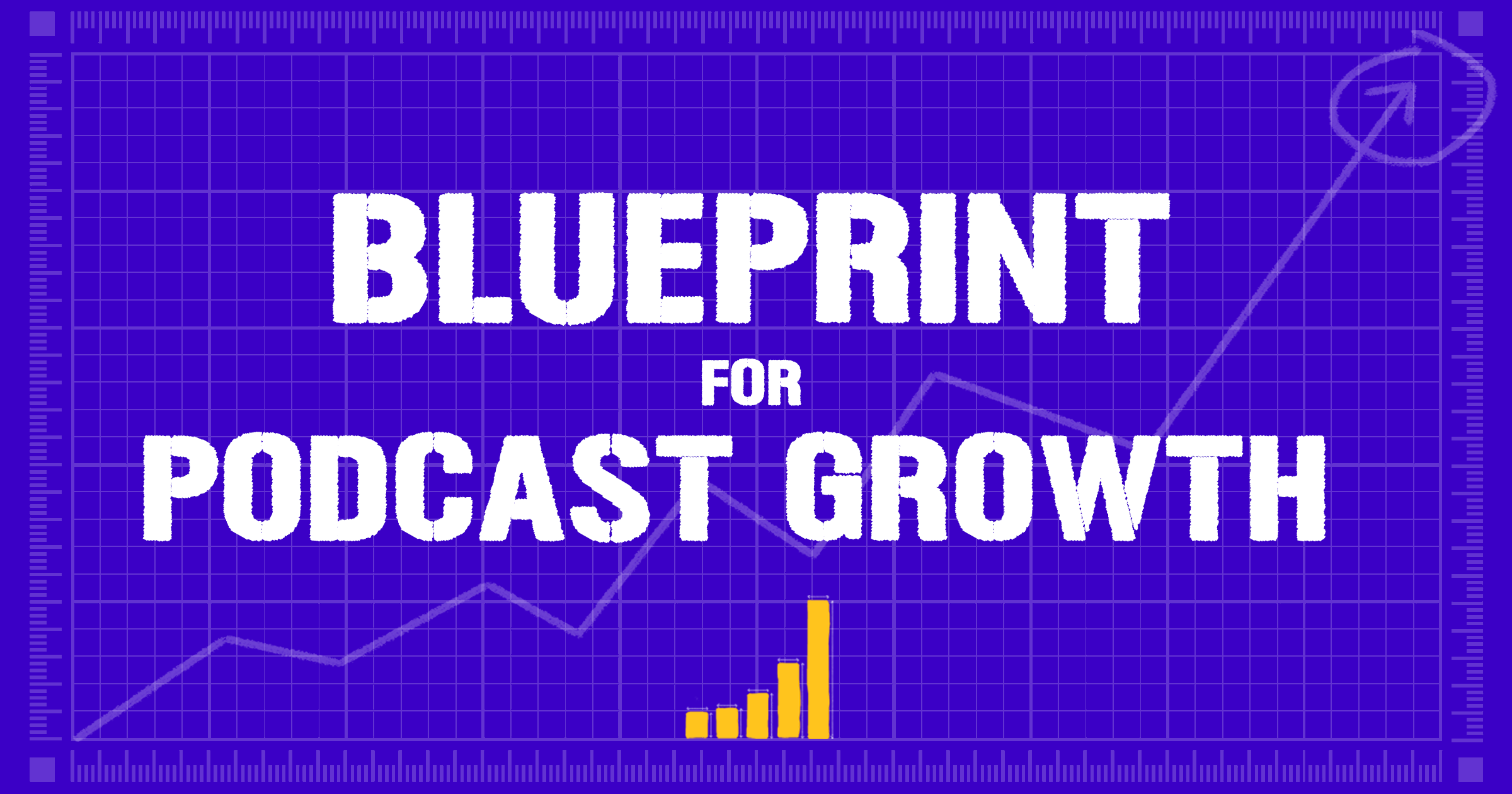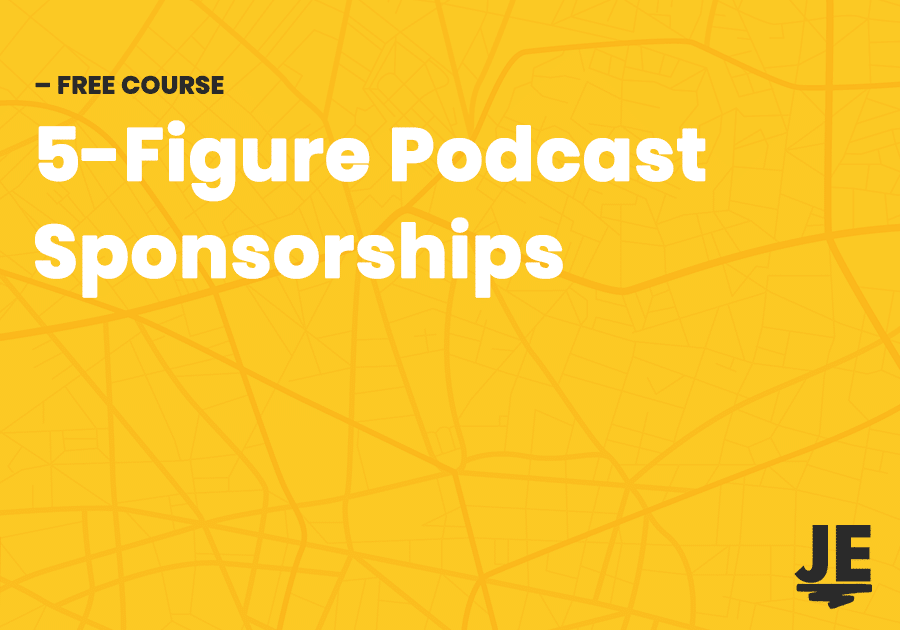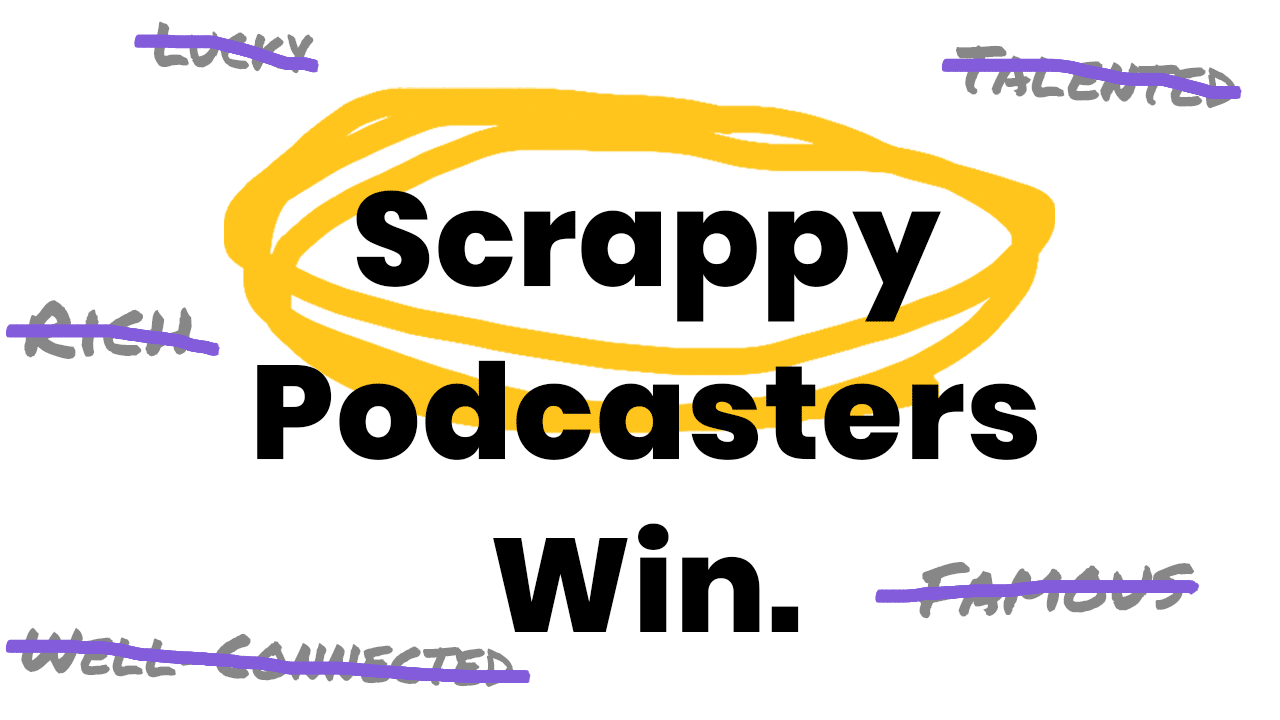Today we’re going to talk about the secret to success. For podcasting, and for anything really.
I know, I know, who do I think I am? Me of all people finally stumbling across the secret that philosophers, scientists, scholars, and the average Joes of history have spent millenia searching for…
Ok, you’re right, I’m not going to argue with all those heavyweights, and let’s maybe back off on the claim that this is the secret to success. Let’s say instead that we’re going to talk about one of the very most important components of achieving and accelerating your success in anything, and we’re going to apply it specifically to podcasting*.
* Welp, not nearly as grandiose as my initial statement, but it was a good opener at least…
I’ve talked before about the value of community, and today we’re going to dive into some real practical ways to both connect with other podcasters, as well as how to use those relationships to help grow each other’s shows and businesses (if that’s a goal), including a strategy that all major podcast networks take advantage of but very few indie podcasters do.
Why Community Matters
In 2015 I started to take this heretofore outlandish idea of building an online, location independent business seriously.
I was listening to podcasts on the topic by the boatload*, and was starting to generate some ideas on avenues I could pursue, and pursue I did.
* I was probably listening to 50+ hours per week, all at 1.5x or 2x speed… I was (and still am) an addict…
Over the next 6 months, I dove into a handful of ideas, testing the waters on each. This involved a lot of domain registrations and a handful of half-finished websites, and a bunch of dead ends.
One website – my photography site – I even finished fully, and blogged regularly on it for probably more than 6 months, building up a small following in the process. The issue with all of these projects, however, was that I had no clear vision for where any of them would go.
I began to get the sense that I was on a hamster wheel, running in place (or if not in place, then in really small circles chasing my tail… Not that I have a tail of course… That would be weird, and I definitely wouldn’t tell you about it on my blog, that would be reserved for a face to face conversation).
Enter Community
At the start of 2016, I realized that I needed a space to share ideas, brainstorm, and to just be with other people who shared my goals. It just so happened that two of the podcasters I looked up to in the location independent (LI) space, Jason Moore and Travis Sherry, were in the process of launching an online community centered around LI businesses.
I could write novels on the specific benefits and cite individual influential interactions stemming from my engagement with the community, but suffice it to say that almost immediately upon joining the community, I started to see some real progress, and get a sense of direction.
Most importantly of all, within a couple months of joining, I had shifted course and rebranded my 5-year-old audio production business – to this point focussed on producing records – to one focused on helping brands and podcasters share their stories through their shows.
After an amazing year of feeling more connected to like-minded people than ever before, I made it a goal in 2017 to further those relationships by meeting regularly in person with many of my closest online connections, as well as investing in conferences like Podcast Movement and World Domination Summit* in an effort to meet even more like-minded people.
* Both events were highlights of my year btw. TOTALLY worth it!
The result has been more success for my business, an ever-increasing list of current and potential collaborators, and developing new friendships that have become some of my very closest.
The two benefits that stand out most of all to me, however, are these:
- I no longer feel the isolation of working towards a goal that no around me understands. When I’m beating my head against the wall in frustration, or need feedback on some idea, I have an ever-growing list of people I can talk to and get some advice or feedback from.
- I am constantly inspired and challenged by what the network of people around me are doing with their lives, businesses, and podcasts. I have been opened up to so many new ideas that have taken my life and business in directions I could never have conceived of on my own.
I don’t know about you, but to me, those sound like two challenges that almost every podcaster would love some help with.
The Podcast Community
The great thing about the podcast community is that once you tap into it, it’s an incredibly warm and supportive group. The issue, it seems, is tapping into that community in the first place however. I’ve had conversations with dozens of podcasters who absolutely love their shows and believe deeply in what they’re doing, but also feel incredibly isolated by the grind of toiling alone, often in relative obscurity (or near-total obscurity in some cases).
It’s often only a matter of time before this lack of connection and support reach a breaking point and result in one more shuttered podcast.
If there’s one thing I’ve noticed about podcasters who succeed – whether that’s financially or artistically or some other metric you define success by – it’s that they not only have a network of other podcasters that they’re in touch with regularly, but it’s that they actively use this network to accelerate the growth of their shows by collaborating with the other podcasters in that network.
This supportive, collaborative, inspirational network is the thing I so grandiosely presented at the top of this article as “The Key To Success”.
Don’t believe me?
Maybe you’ll believe the likes of podcast heavyweights like Cliff Ravenscraft, Pat Flynn, Amy Porterfield and Jon Lee Dumas, who’ve helped each other start from the bottom and ascend to becoming some of the brightest stars not only in the podcasting world, but the online business world as a whole. Any of them will tell you that without their community, there is ZERO chance they would be where they are now.
So how do you start building a community of your own?
Community Building
At the most basic level, I’d start by signing up to some podcasting facebook groups. There are a number of them out there, and each has a different vibe. I started one earlier this year called The Cut The Bullshit Podcasting Community with the goal of creating the most honest, open, vulnerable, heartfelt podcast community out there, and the interactions that take place in the group routinely bring tears to my eyes (of joy, pride, and faith in humanity).
While I and many others love the vibe of the group, many undoubtedly don’t. Maybe all the openness and vulnerability sounds too mushy for you. That’s cool. I’m sure there is another group that is a great fit for you!
The thing about building your community, however, is that it’s about building strong relationships, and giving as much (or more) than you take. So while I would recommend checking out various groups and communities, whether that be on Facebook or any other platform, once you find your tribe, dig in and commit to getting to know your fellow podcasters in that group, rather than dividing your energy among 5 groups simultaneously.
Other great options include attending (or starting) local podcasting meetups, or attending any of the many podcasting conferences and events that happen around the world each year. Keep in mind that while in-person relationships can blossom much quicker, there is still much work to be done to deepen those connections.
Deepening Your Connections
Whether you’ve made your connections online, in person at local podcasting meetups, or at regional, national, or international conferences, this is where the real work begins. If you want to unlock the real benefits from your budding network, it’s going to take some time and effort from everyone involved.
I’ve always been a pretty extreme introvert, and have historically never been the one to initiate calls or get-togethers, even with close friends. This past year, however, with my intense appreciation for and commitment to growing my community, I’ve begun reaching out to different members of my network regularly. I probably have 4 calls a week with various friends who are all working towards similar online business and podcasting goals, but in very different industries or niches. Some of these calls are standing, weekly or bi-weekly appointments, and others are less formal, often spur of the moment events.
Almost without fail, conversations meant to simply catch up over a half hour call turn into 2 or 3 hour long calls where both of us leave buzzing with new ideas, inspiration, and motivation to keep grinding away, doing the work one day at a time.
Tell me having one of those calls a week, or even a month wouldn’t improve your podcast?
Setting Up A Mastermind Group
If you really want jump start your podcast growth, I’d highly recommend setting up a small mastermind group with some fellow podcasters. If you’re not familiar with the term, put simply, a mastermind group is a small group of people working towards the same goals, who meet regularly to keep each other inspired, motivated, and accountable to their goals.
These groups have been essential to my growth as they provide a trusted framework for feedback, support, and accountability, ensuring I’m continuing to move towards both my long and short-term goals.
Again, going back to Cliff and Pat, they’ve been involved in a mastermind together for years, along with a handful of other big-name podcasters in the online business space. Cliff even offers his own mastermind now, and while I have no doubt that the results would be phenomenal, the cost is well out of reach for the average podcaster.
The good news is that you don’t have to spend a ton (or even any) money to form an impactful mastermind group, however. While having a trusted and knowledgeable mentor guiding the group does have some huge benefits in terms of guiding the conversations and providing accountability, the real value is in the back and forth with the other group members.
I can’t recommend highly enough reaching out to some of the other podcasters you know and proposing regular group calls to discuss the direction of your shows, brainstorm new ideas, and support each other through the ups and downs of podcasting.
Mastermind Structure
The groups I currently take part in and have taken part in in the past have ranged from 2-6 people and have adopted various formats. While they sometimes consist of a more casual, roundtable discussion, the more common format would be the Hot Seat format, wherein each week’s call focuses specifically on one member and their show.
Usually these calls start off with a short roundtable check in on what everyone’s been up to since the last call before moving on to focusing on that week’s hot seat member, dissecting what they’re doing with their show, where they could improve, promotional strategies they could be trying, people they should be connecting with, and anything else applicable to where they’re at with their show.
Do some research and decide with your group how you want to format your mastermind. However you do it though, I’m absolutely confident that within a few calls you’ll realize the value that the group is giving you and wonder how you ever thought about trying to create a standout podcast without one.
One note about masterminds. It can sometimes take a little bit of time to find the right fit of people, so take care when choosing members initially, or inviting in new members later. I’ve been in groups that clicked immediately, and others that didn’t and fell apart after a month or two. If you don’t find the fit initially, keep working at it, the results are more than worth it, even if they take some time.
Putting Your Network To Work
So the inherent benefits of having a strong community of other podcasters including support, motivation, and inspiration are great, but there are some other practical benefits that community can have on your show as well, many of which I feel are underutilized.
One of the first opportunities that comes to mind is swapping ratings and reviews. While it’s an impossible task to listen to and review every podcast in many of the online podcasting groups out there, it’s entirely more reasonable to reach out to 5 other podcasters in a similar space* to you and agree to listen to and review each other’s shows over the next week or two.
* I suggest looking for other podcasters in a similar space just because if people are actually interested in the subject matter there’s a greater chance they’ll actually listen and review.
If you really want to streamline this (you’re all busy, I get it), I’d suggest everyone highlight one strong, 5 or 10-minute section in one of their episodes that is indicative of the podcast as a whole, and directs everyone there to get a taste of the show to base a review off of.
Rinse and repeat with as many interested podcasters that you can find.
Promo Swapping
The second strategy is a little more exciting to me, and has the potential to have a much bigger impact on your show.
Once you’re found and connected with a handful of podcasters who are podcasting on similar topics to you, I would HIGHLY recommend doing a promo swap. This is one of the easiest ways to expand your audience and it boggles my mind that more podcasters aren’t doing this, especially when all the big networks do it regularly and have laid the blueprint out for all to see.
There are a couple of ways you could do this:
- Take an “ad break” at some point in your show and read a promo for one of the podcasts you’ve agreed to swap with. This could either be something that you’ve written specifically for the other podcast, or something that the host of that show has written for you to read. They do the same by reading a promo for your show on theirs.
- Each podcaster records a short promo of their own show and the group swaps promos with each other. This could include snippets of actual show content or just you talking about your show. I like these because you record this promo once and it can be used by any number of podcasters who you swap with.
- At the end of one of your episodes, give a shoutout to one of the shows in your exchange circle and then play either a segment or an entire episode from that show that you know your audience would be into. Radiotopia does this regularly to great effect.
You can make use of any of these promo swapping strategies with as little as one other podcaster, or create a small group. A couple things to keep in mind:
- You should be confident that a good portion of your audience will be interested in any shows you promote.
- I wouldn’t suggest running these promos more than once a month lest they become background noise to your audience.
- Make sure everyone who’s participating is on the same page in regards to style of promo, frequency, and any other details.
- Experiment with the different styles and see what works best!
The Co-Release
Alright, so this is probably my most favourite podcast promo method, and the first podcasters I heard do it were the two I mentioned waaaay back at the start of this article, Jason Moore who hosts the Zero To Travel Podcast, and Travis Sherry from Extra Pack Of Peanuts.
Both are travel podcasts, and while it might be easy to think of them as being in competition with each other, their shows are very different in style, and seem to initially attract different audiences. That doesn’t mean that there isn’t significant interest overlap, however.
What Jay and Trav will do is come up with an episode topic that is perfect for a 2-part episode, and then record those episodes back to back together.
Where the cross-promotion comes in, however, is that they’ll each take ownership of one of the two episodes. Maybe Jay will take part one of the episode and host that episode on his feed, with his intro and outro music and so on, while Trav will take part two and host that on his feed with his own branding. Note that each episode is released on one feed only, not both.
They’ll post these episodes simultaneously, making sure to make it clear to the listeners that to get the other half of the episode, they’ll have to check out the other feed to get it.
I don’t know about you, but to me, this is genius. If you’re already a fan of one of the hosts and you listen to one half of one of these episodes, of course you’re going to go check out the other show, at the very least to get the complementary half of the split show, if not subscribe to future episodes as well.
For anyone who grew up listening to small time, underground bands, you’ll recognize this as exactly the same as when bands would put out split eps with another band. It worked then and it still works today, albeit in a different medium.
Jay and Trav will do this technique a few times a year, and sometimes they’ll even have additional guests or a roundtable on for these episodes. I highly recommend finding another show that’s closely aligned with your target audience and trying this type of co-release out!
Go Forth And Commune
I know it might seem at first glance that these practical tips on how to boost your show with a community of like-minded podcasters are the real value and what will provide the most benefit to your podcast. But as you cultivate your community and engage more deeply with it, you’ll quickly realize that it’s the intangibles that make all the difference.
That’s not as sexy as quick wins, but the things that matter rarely are. Nevertheless, ask anyone who’s achieved success in any realm and I’m guessing they rank their network as one of the most important keys to that success.
If you’re looking for a podcast-focused community of your own and you’ve made it this far in the article, I’m guessing you’d probably enjoy hanging out with the amazing group of podcasters in The Cut The Bullshit Podcasting Community. So come on in, say hi and let’s create something cool together!
I’d love to hear what your podcasting network and community looks like, or if you’ve felt that isolation that being a podcaster often seems to entail. If you have found a supportive network, what benefits have you seen? How did you connect with them initially? Leave me a comment pleeeeeaaaase!
A Couple Recommended Reads
I just wanted to highlight a couple of books that have inspired and solidified my thinking around community. I listen primarily on Audible (get 2 free books with this link), but you can pick them up on Amazon in print or Kindle versions as well!
Think and Grow Rich by Napoleon Hill – This is a classic for a reason, and it’s in this book where Napoleon first coins the now popular term Mastermind Group. This book shaped many of my current daily habits and practices.
Real Artists Don’t Starve by Jeff Goins – Essential reading for creatives of all kinds (including podcasters) who would love to make a living from their art. My favourite part of the book was the discussion on community, referencing J.R.R. Tolkien and C.S. Lewis.
* Note that these are affiliate links. They won’t cost you a penney more, and I’ll get a tiny commission from Amazon for recommending them 🙂
[mailerlite_form form_id=2]
- Why Wouldn’t They Just Google It? - March 14, 2021
- Before You Can Market Your Podcast, You Need To Create A Marketable Podcast - March 11, 2021
- Podcast Promotion & Marketing Are Different (Here’s How to Use Each Effectively) - March 10, 2021




